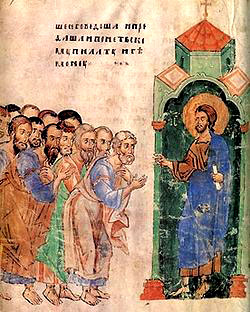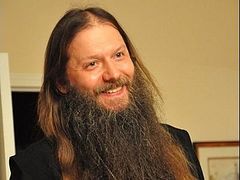Once a month in the Sretensky Theological Seminary, the students gather at midnight to attend Divine Liturgy and partake of the Holy Mysteries of Christ. Last Saturday morning, November 7/20, Archimandrite Tikhon, gave a sermon to these young men preparing for service to the Church.
* * *
Then he called his twelve disciples together, and gave them power and authority over all devils, and to cure diseases. And he sent them to preach the kingdom of God, and to heal the sick. And he said unto them, Take nothing for your journey, neither staves, nor scrip, neither bread, neither money; neither have two coats apiece. And whatsoever house ye enter into, there abide, and thence depart. And whosoever will not receive you, when ye go out of that city, shake off the very dust from your feet for a testimony against them. And they departed, and went through the towns, preaching the gospel,
and healing every where (Lk. 9:1-6).
In the name of the Father, Son, and Holy Spirit!

However, this time the Lord says to His disciples these amazing words: When you go forth with the word of God to do the great works of God, do not take anything with you— neither staves, nor scrip, neither bread, neither money; neither have two coats apiece…
We are ready to fulfill the will of God! But our weak faith and fearful heart timidly ask, alarmed, “What is a person sent out by Lord into this harsh, unfriendly world supposed to live on?”
The answer to this question is also given to us at this Liturgy. In the reading of the Epistles, we hear the Apostle Paul say to the Galatians, The just shall live by faith (Gal. 3:11).
What is this? What special faith is the Lord talking about? The faith which upholds the disciple of Christ in everything, which gives the highest meaning to life, provides everything needed in this temporal life, and everything needed to serve God? Probably we are speaking of the faith we read about in the Holy Scriptures and in the Lives of the Saints; the faith which healed, worked miracles, gave unshakeable courage to the martyrs, fed the desert dwellers, and carried humble ascetics into the heavenly realms. It is that great faith which is so mysterious and unfathomable to us; faith that, we must admit, disturbs us when we read Christ’s words in the Gospels, heal the sick, cleanse the lepers, raise the dead, cast out the demons! After all, these are not mere words. This is the Savior’s command to His disciples—that is, to us.
Yes, we understand our weakness before these commands, and yet at the same time we know that it is possible! Each one of us has been a witness, or even a participant in the fulfillment of these or similar promises of God. Otherwise we would not be standing here in this church, at the Table of the Lord.
About what kind of faith of Christ’s true disciple are we speaking, and how can we attain such faith? We consider ourselves believers in God, and consider faith to be the most important, most precious treasure of our lives. But we have to know that faith can vary, and we have to test ourselves to know what step of faith we are on.
Many people have taken the first step; and I have to say, not only people. This faith is a person's knowledge of something for a fact. He believes that the Amazon River flows through South America. He believes that the sun is an enormous star. He believes in the existence of God. This kind of faith quite often has no influence at all upon a person’s life. Furthermore, not only people have it. The devils also believe, and tremble—we recall those words of the Apostle James (2:9). This belief will not heal a suffering neighbor’s body, nor even the very soul or temperament of the one who limits himself to that kind of faith.
There is a second step of faith, which the majority of people have, including the Orthodox: trust in God. We want to hope in Him with our whole heart, we have had personal experience of communion with God, and this experience tells us that God can and should be trusted like no one else in this life. Nevertheless, there are times when we believe, and times when we step away from the Lord. We believe in Him, but to our great misfortune, we cannot say that we are always faithful to Him. We can stumble and betray our faith, and that means that we betray the Lord Himself.
But there is also the highest step of faith.
This is not just “belief” as in conviction; it is not even “trust,” but rather something more: it is faithfulness, dedication!
If the first step of faith is the belief of reason, and if the second step is faith in the soul and heart, then the third step of faith includes all of our forces—reason, soul, and what is called in the Holy Scriptures, “strength,” a person’s will. Do you remember: Thou shalt love the Lord thy God with all thy heart, and with all thy soul, and with all thy mind, and with all thy strength (Mk. 12:30)? This kind of love is not possible without faithfulness and dedication. Love and faith are inseparable. About the kind of faith the Lord seeks in us, we could say: Be faithful and dedicated to God with all your heart, all your soul, all your mind, and all your strength!
Be thou faithful unto death, and I will give thee a crown of life (Rev. 2:10), says the Lord. This is that very faith which unites a person forever with God. This is that very faith by which the righteous man lives. He can no longer commit sin, and his every action will be righteous. Such a righteous one will not ponder which is more important—faith or works, because his works will be inseparable from faith. This is the faith of the saints; this faith heals, resurrects, prophesies, loves, forgives, and hopes. It leads the whole Church to Life Eternal.
Yes, it is this very faith that the Lord expects from us! But where can we get such faith? Fathers and brothers, it is, no doubt, in the heart of each and every one of us! It just needs to be found and perceived—this faithfulness and dedication to God.
Faithfulness, dedication… These are infinitely priceless qualities! Any betrayal of them, even the most trifling, even half-joking, even under pressure and not from the heart, is a devastation of love. Remember your own personal experiences in life, how terrible and painful that is. But in relation to the Lord God, a betrayal is the destruction of our communion with Him! Only divine intervention can restore our connection with God, as it was restored by Christ Himself to the Apostle Peter who betrayed Him. Divine intervention is always a miracle. We so often go to confession, but we do not apprehend what a great mercy and miracle it is.
Dedication and faithfulness to the Lord is an infinite treasure that is preserved in each one of us. If only we could perceive it; and like a careful gardener, tend the fruits of faithfulness and dedication to God, nurture it, think about it, and foster this feeling. If we make the cultivation of this fruit our main goal, then everything else will be added unto it, as everything is added unto love and true faith.
This, brothers and fathers, is what I wanted to tell you. Thank you for your prayers and chanting. But just look—at this Liturgy, right on the very night once in the month when you, future pastors, take Communion together—how the Lord vouchsafes us once more to hear the Gospel about the sending forth of the Apostles, your great and holy predecessors. May you also strive to have that same faith, faithfulness, and dedication to God and the work for which He is raising you up. Amen.
Translated by Nun Cornelia



